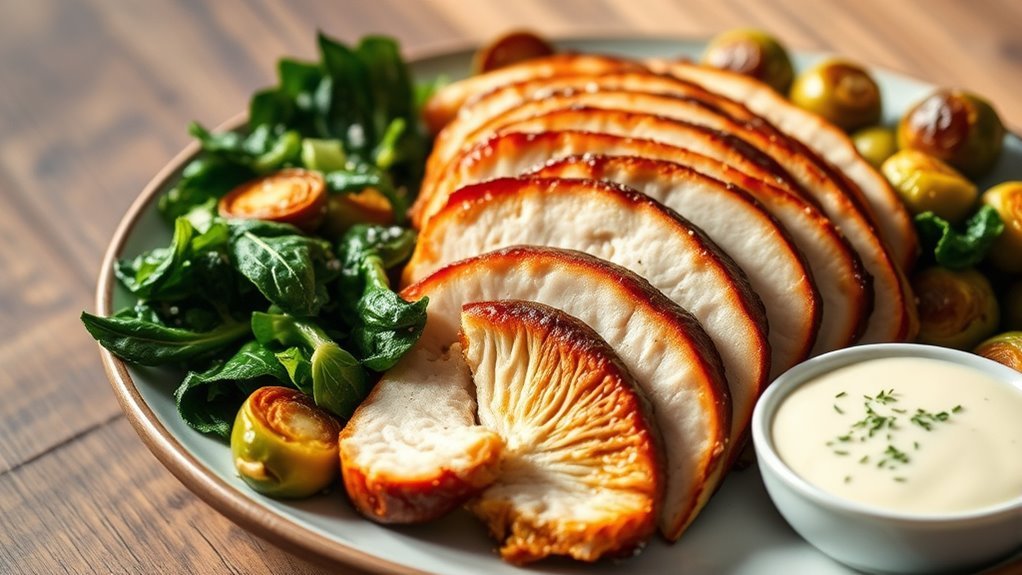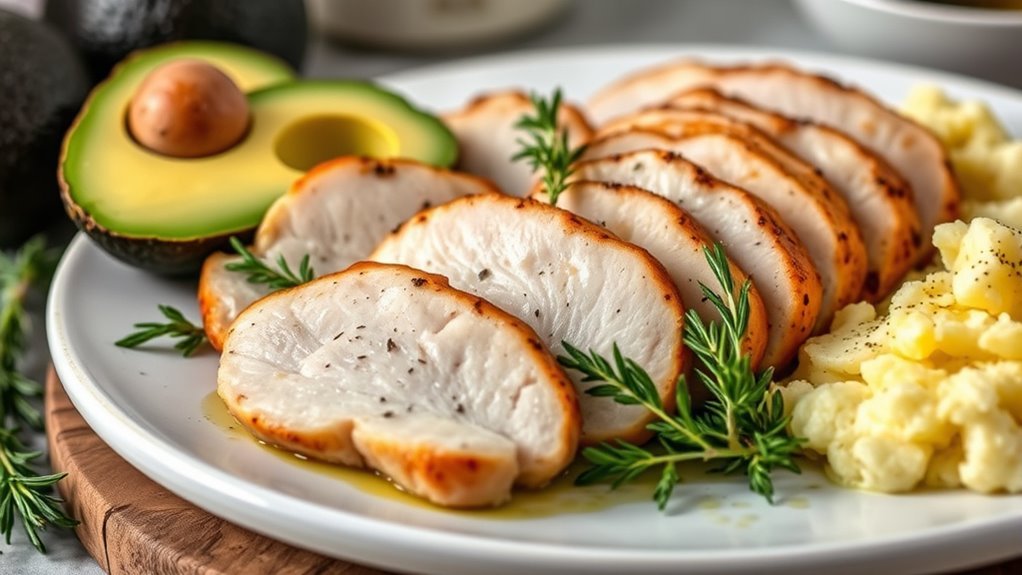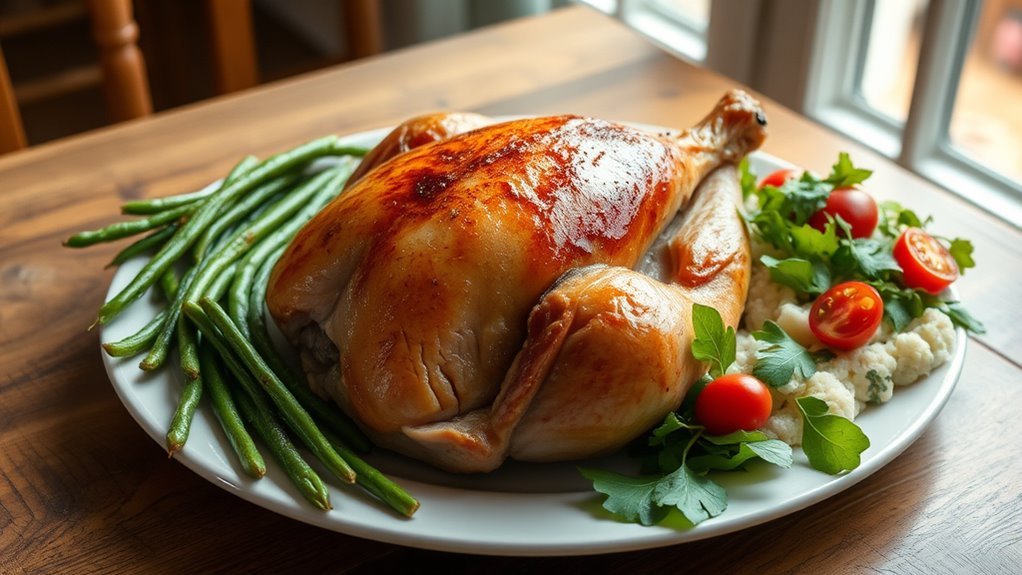Yes, turkey is keto-friendly! It’s a low-carb, high-protein source that fits perfectly into your ketogenic diet. Both white and dark meats provide essential nutrients and healthy fats, with dark meat offering a richer flavor. You can enjoy turkey in various dishes, and it helps maintain muscle while keeping you satisfied. Remember to check for added sugars in processed turkey products. If you’re curious about cooking methods and meal ideas, there’s more to explore!
Nutritional Breakdown of Turkey

When considering the ketogenic diet, understanding the nutritional breakdown of turkey is essential. Turkey varieties, such as white meat and dark meat, offer different nutritional profiles. White meat is leaner, typically containing fewer calories and fat, while dark meat is slightly higher in fat and calories but adds richness to your meals. Both provide important nutrients, including B vitamins and selenium.
When it comes to flavoring, turkey seasoning plays a significant role in enhancing your dishes without adding carbs. Opt for herbs and spices like rosemary, thyme, or garlic powder to keep your meals keto-friendly. By knowing the nutritional aspects of turkey and how to season it, you can enjoy satisfying meals that align with your dietary goals while feeling liberated in your food choices.
Protein Content and Its Benefits

While you’re steering through the ketogenic diet, the protein content of turkey can be a significant advantage. It’s not just about filling your plate; turkey is one of the best protein sources available, packed with essential amino acids that support muscle growth and repair. Additionally, turkey’s versatility in meals allows it to be paired with low-carb vegetables, which can create balanced and nutritious dishes.
| Protein Source | Health Benefits |
|---|---|
| Turkey | Builds muscle, aids recovery |
| Chicken | Supports weight loss |
| Beef | Boosts metabolism |
| Fish | Enhances heart health |
Including turkey in your meals can help you meet protein needs while staying within keto guidelines. Plus, the low-fat content allows for healthy fat options elsewhere in your diet, ensuring a balanced approach to nutrition. Enjoy the freedom of flavorful meals while reaping the health benefits!
Types of Turkey: Which Is Best for Keto?

Which type of turkey is best suited for your ketogenic lifestyle? When choosing turkey, consider the following options that align well with keto principles:
- Ground Turkey: Lean and versatile, it can be used in various dishes while keeping carbs low.
- Smoked Turkey: Packed with flavor, it often contains fewer additives than processed meats, making it a great option.
- Turkey Breast: Low in fat and high in protein, it’s ideal for those monitoring their fat intake.
- Dark Meat Turkey: Higher in fat and flavor, this cut can help meet your keto macros.
- Turkey Sausages: Check for sugar content; they can be a tasty, convenient choice.
Incorporating turkey into your diet can provide lean protein sources that support your health goals while adhering to keto principles. These options provide you with flexibility while sticking to your keto goals.
How Turkey Fits Into the Ketogenic Macros
When considering turkey on a ketogenic diet, it’s crucial to look at its nutritional profile and how it aligns with your macro goals. Turkey is high in protein and low in carbohydrates, making it a suitable choice for maintaining ketosis. Understanding ideal serving sizes can help you maximize its benefits while staying within your daily macro limits.
Nutritional Profile Overview
Turkey is an excellent source of protein that aligns well with the ketogenic diet’s macronutrient requirements. This versatile meat comes in various turkey varieties, each offering unique flavors and textures. Including turkey in your meals can provide numerous health benefits while keeping your carb intake low. Here’s a quick overview of its nutritional profile:
- High Protein: Supports muscle maintenance and repair.
- Low in Carbs: Fits perfectly within keto guidelines.
- Rich in B Vitamins: Aids in energy production and brain health.
- Contains Essential Minerals: Such as selenium and phosphorus, important for metabolic functions.
- Healthy Fats: Especially in dark meat varieties, contributing to satiety.
Incorporating turkey into your diet can be both delicious and beneficial!
Ideal Serving Sizes
To effectively incorporate turkey into your ketogenic diet, it’s essential to understand ideal serving sizes that align with your macro goals. A typical serving size of turkey is around 3 to 4 ounces, providing approximately 25 to 30 grams of protein while keeping carbs minimal. For best results, consider these serving suggestions: pair turkey with low-carb vegetables or healthy fats like avocado or olive oil to maintain your desired fat-to-protein ratio. Portion control is vital; overindulging can disrupt your ketosis. Remember, everyone’s macro needs differ, so adjust your servings based on your personal goals. By paying attention to these details, you can enjoy turkey while staying aligned with your ketogenic lifestyle. Additionally, incorporating turkey into your meals can help support fat adaptation as your body adjusts to using fat for energy.
Cooking Methods for Keto-Friendly Turkey Dishes
While you might associate turkey with traditional holiday meals, it can also be a versatile protein for your keto-friendly dishes. There are several cooking methods that can keep your turkey dishes low in carbs while enhancing flavor and texture. Consider these options:
- Grilling techniques: Perfect for juicy, smoky turkey burgers or skewers.
- Roasting options: A whole turkey can be seasoned and roasted for a tender, flavorful centerpiece.
- Sautéing: Quick and easy for turkey stir-fries with low-carb veggies.
- Slow cooking: Ideal for turkey chili or shredded turkey dishes that are packed with flavor.
- Baking: Create turkey meatballs or casseroles that fit your keto lifestyle.
Additionally, incorporating vegetables like broccoli into your turkey dishes can enhance nutritional value while keeping carbs low. Experiment with these methods to enjoy turkey in a delicious, keto-friendly way!
Creative Ways to Incorporate Turkey Into Your Meals
When you’re looking to add variety to your meals, incorporating turkey can be a game-changer due to its versatility and nutritional benefits. One creative way to enjoy turkey is by making invigorating turkey salads. Mix diced turkey with leafy greens, cherry tomatoes, and a zesty vinaigrette for a satisfying dish that’s low in carbs. Another option is to prepare turkey wraps using lettuce leaves instead of tortillas. Fill them with sliced turkey, avocado, and your favorite veggies for a quick, portable meal. These methods not only keep your meals interesting but also guarantee you’re getting a lean source of protein. Experimenting with different flavors and ingredients will help you find the perfect turkey dishes that suit your taste and nutritional goals.
Potential Concerns and Tips for Eating Turkey on Keto
Incorporating turkey into your meals can be a healthy choice, especially on a keto diet, but there are some potential concerns to keep in mind. Here are a few tips to guarantee you’re making the best choices:
- Watch sodium levels: Processed turkey products can be high in sodium, which may lead to water retention.
- Consider fat content: Opt for turkey thighs over breasts for a higher fat content, which fits better in a keto lifestyle.
- Check for additives: Some turkey products contain fillers or sugars that can disrupt your carb count.
- Portion control: Balance your turkey intake with low-carb veggies for a well-rounded meal.
- Cooking methods: Favor roasting or grilling to minimize added fats, keeping your meals healthy and keto-friendly.
- Nutritional balance is key: Incorporating nutrient-dense low-carb foods alongside turkey can help maintain overall health while following the keto diet.
Frequently Asked Questions
Can I Eat Turkey on a Vegetarian Keto Diet?
You can’t eat turkey on a vegetarian keto diet since it’s not plant-based. However, you can explore various vegetarian alternatives that are keto-friendly proteins. Consider options like tofu, tempeh, seitan, or legumes, which provide vital nutrients while keeping carbs low. Incorporating these alternatives can help you maintain a balanced diet without compromising your vegetarian lifestyle. Remember, it’s important to check nutritional values to guarantee you stay within your keto goals.
Does Turkey Contain Any Hidden Sugars?
Turkey’s like a hidden treasure in the world of nutrition, but you might wonder, does it contain any hidden sugars? Thankfully, turkey is naturally low in sugars, typically boasting zero grams per serving. It’s rich in protein and essential nutrients, making it a great choice for your diet. However, always check labels, especially for processed turkey products, as they may contain added sugars. Keep your meals free and flavorful with whole, unprocessed turkey!
How Does Turkey Affect Cholesterol Levels?
Turkey can positively affect cholesterol levels thanks to its lean protein content. When you incorporate turkey into your diet, you’re likely to benefit from better cholesterol management. It’s low in saturated fat, which can help maintain healthy cholesterol levels. By choosing turkey over fattier meats, you can enjoy its nutritional benefits while supporting your heart health. Just remember, balance is key, so pair it with plenty of vegetables for a wholesome meal.
Is Deli Turkey Processed or Healthy?
Deli turkey’s definitely a convenient choice, but it’s often processed, which can complicate its nutritional profile. Many deli turkeys contain preservatives and sodium, impacting overall health. While deli turkey provides protein and some essential nutrients, the processed meat effects can lead to concerns like increased cholesterol or heart risks if consumed excessively. So, balance is key—enjoy deli turkey in moderation, and pair it with fresh veggies for a healthier meal option!
Are There Any Allergies Related to Turkey?
Yes, turkey allergies can occur, though they’re relatively uncommon. If you’re allergic, your immune system reacts to proteins in turkey, potentially causing symptoms like hives or digestive issues. Some people experience turkey intolerance, which might lead to gastrointestinal discomfort without an immune response. If you suspect an allergy or intolerance, it’s best to consult a healthcare professional for testing and guidance. Always prioritize your health and well-being when introducing new foods into your diet.
Frequently Asked Questions about Turkey and the Keto Diet
1. Is turkey a suitable meat for a keto diet?
Yes, turkey is an excellent choice for a keto diet. It is low in carbohydrates and high in protein, making it compliant with the dietary requirements of a ketogenic lifestyle. Turkey contains essential nutrients such as B vitamins, selenium, and phosphorus, which are beneficial for overall health while on a keto diet.
2. What cuts of turkey are the best for keto?
When following a keto diet, dark meat turkey cuts, such as thighs and drumsticks, are preferable due to their higher fat content compared to white meat cuts like turkey breast. The increased fat content helps you meet your daily fat intake goals while keeping carbohydrates low.
3. Can I eat processed turkey products on a keto diet?
While processed turkey products like turkey bacon or deli meats can be enjoyed on a keto diet, it is essential to read the labels carefully. Many processed meats contain added sugars, fillers, or preservatives that could increase carbohydrate intake. Opt for products with minimal ingredients and no added sugars to stay within your keto guidelines.
4. How can I incorporate turkey into my keto meals?
Turkey can be incorporated into your keto meals in various ways. You can roast a whole turkey with keto-friendly herbs and spices, prepare turkey stir-fry with low-carb vegetables, or make turkey meatballs using almond flour as a binder. Additionally, turkey can be used in salads, soups, or as a filling in lettuce wraps to create low-carb, satisfying meals.
5. Are there any health benefits of eating turkey on a keto diet?
Yes, consuming turkey on a keto diet offers several health benefits. Turkey is a great source of high-quality protein, which aids in muscle maintenance and repair. It also contains nutrients that support immune function and overall health. Furthermore, the healthy fats from turkey, especially when opting for dark meat, can help keep you satiated, making it easier to adhere to your keto diet without feeling deprived.
References
- https://www.ncbi.nlm.nih.gov/pmc/articles/PMC6070625/
- https://www.healthline.com/nutrition/what-is-the-keto-diet
- https://www.mayoclinic.org/healthy-lifestyle/nutrition-and-healthy-eating/in-depth/keto-diet/art-20459889
- https://www.webmd.com/diet/what-is-the-keto-diet
- https://www.cdc.gov/healthyweight/assessing/bmi/adult_bmi/english_bmi_calculator/bmi_calculator.html
- https://www.who.int/news-room/fact-sheets/detail/healthy-diet
- https://www.hsph.harvard.edu/nutritionsource/healthy-weight/low-carb-diets/


